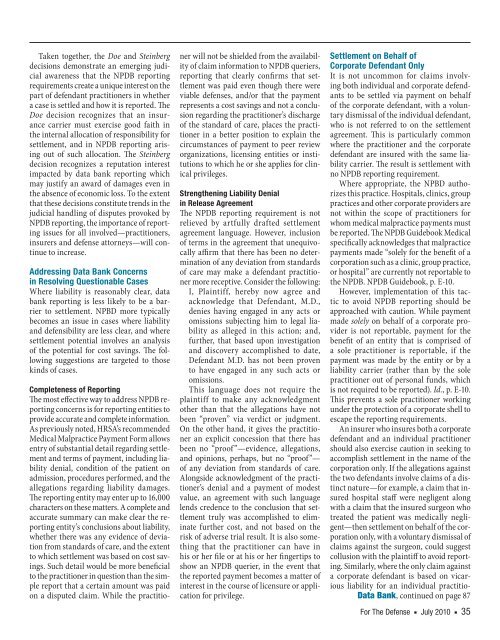For The Defense, July 2010 - DRI Today
For The Defense, July 2010 - DRI Today
For The Defense, July 2010 - DRI Today
- No tags were found...
Create successful ePaper yourself
Turn your PDF publications into a flip-book with our unique Google optimized e-Paper software.
Taken together, the Doe and Steinbergdecisions demonstrate an emerging judicialawareness that the NPDB reportingrequirements create a unique interest on thepart of defendant practitioners in whethera case is settled and how it is reported. <strong>The</strong>Doe decision recognizes that an insurancecarrier must exercise good faith inthe internal allocation of responsibility forsettlement, and in NPDB reporting arisingout of such allocation. <strong>The</strong> Steinbergdecision recognizes a reputation interestimpacted by data bank reporting whichmay justify an award of damages even inthe absence of economic loss. To the extentthat these decisions constitute trends in thejudicial handling of disputes provoked byNPDB reporting, the importance of reportingissues for all involved—practitioners,insurers and defense attorneys—will continueto increase.Addressing Data Bank Concernsin Resolving Questionable CasesWhere liability is reasonably clear, databank reporting is less likely to be a barrierto settlement. NPBD more typicallybecomes an issue in cases where liabilityand defensibility are less clear, and wheresettlement potential involves an analysisof the potential for cost savings. <strong>The</strong> followingsuggestions are targeted to thosekinds of cases.Completeness of Reporting<strong>The</strong> most effective way to address NPDB reportingconcerns is for reporting entities toprovide accurate and complete information.As previously noted, HRSA’s recommendedMedical Malpractice Payment <strong>For</strong>m allowsentry of substantial detail regarding settlementand terms of payment, including liabilitydenial, condition of the patient onadmission, procedures performed, and theallegations regarding liability damages.<strong>The</strong> reporting entity may enter up to 16,000characters on these matters. A complete andaccurate summary can make clear the reportingentity’s conclusions about liability,whether there was any evidence of deviationfrom standards of care, and the extentto which settlement was based on cost savings.Such detail would be more beneficialto the practitioner in question than the simplereport that a certain amount was paidon a disputed claim. While the practitionerwill not be shielded from the availabilityof claim information to NPDB queriers,reporting that clearly confirms that settlementwas paid even though there wereviable defenses, and/or that the paymentrepresents a cost savings and not a conclusionregarding the practitioner’s dischargeof the standard of care, places the practitionerin a better position to explain thecircumstances of payment to peer revieworganizations, licensing entities or institutionsto which he or she applies for clinicalprivileges.Strengthening Liability Denialin Release Agreement<strong>The</strong> NPDB reporting requirement is notrelieved by artfully drafted settlementagreement language. However, inclusionof terms in the agreement that unequivocallyaffirm that there has been no determinationof any deviation from standardsof care may make a defendant practitionermore receptive. Consider the following:I, Plaintiff, hereby now agree andacknowledge that Defendant, M.D.,denies having engaged in any acts oromissions subjecting him to legal liabilityas alleged in this action; and,further, that based upon investigationand discovery accomplished to date,Defendant M.D. has not been provento have engaged in any such acts oromissions.This language does not require theplaintiff to make any acknowledgmentother than that the allegations have notbeen “proven” via verdict or judgment.On the other hand, it gives the practitioneran explicit concession that there hasbeen no “proof”—evidence, allegations,and opinions, perhaps, but no “proof”—of any deviation from standards of care.Alongside acknowledgment of the practitioner’sdenial and a payment of modestvalue, an agreement with such languagelends credence to the conclusion that settlementtruly was accomplished to eliminatefurther cost, and not based on therisk of adverse trial result. It is also somethingthat the practitioner can have inhis or her file or at his or her fingertips toshow an NPDB querier, in the event thatthe reported payment becomes a matter ofinterest in the course of licensure or applicationfor privilege.Settlement on Behalf ofCorporate Defendant OnlyIt is not uncommon for claims involvingboth individual and corporate defendantsto be settled via payment on behalfof the corporate defendant, with a voluntarydismissal of the individual defendant,who is not referred to on the settlementagreement. This is particularly commonwhere the practitioner and the corporatedefendant are insured with the same liabilitycarrier. <strong>The</strong> result is settlement withno NPDB reporting requirement.Where appropriate, the NPBD authorizesthis practice. Hospitals, clinics, grouppractices and other corporate providers arenot within the scope of practitioners forwhom medical malpractice payments mustbe reported. <strong>The</strong> NPDB Guidebook Medicalspecifically acknowledges that malpracticepayments made “solely for the benefit of acorporation such as a clinic, group practice,or hospital” are currently not reportable tothe NPDB. NPDB Guidebook, p. E-10.However, implementation of this tacticto avoid NPDB reporting should beapproached with caution. While paymentmade solely on behalf of a corporate provideris not reportable, payment for thebenefit of an entity that is comprised ofa sole practitioner is reportable, if thepayment was made by the entity or by aliability carrier (rather than by the solepractitioner out of personal funds, whichis not required to be reported). Id., p. E-10.This prevents a sole practitioner workingunder the protection of a corporate shell toescape the reporting requirements.An insurer who insures both a corporatedefendant and an individual practitionershould also exercise caution in seeking toaccomplish settlement in the name of thecorporation only. If the allegations againstthe two defendants involve claims of a distinctnature—for example, a claim that insuredhospital staff were negligent alongwith a claim that the insured surgeon whotreated the patient was medically negligent—thensettlement on behalf of the corporationonly, with a voluntary dismissal ofclaims against the surgeon, could suggestcollusion with the plaintiff to avoid reporting.Similarly, where the only claim againsta corporate defendant is based on vicariousliability for an individual practitio-Data Bank, continued on page 87<strong>For</strong> <strong>The</strong> <strong>Defense</strong> n <strong>July</strong> <strong>2010</strong> n 35
















